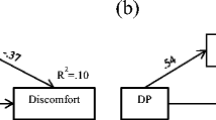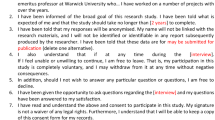Abstract
This paper aims at investigating the perceived difference between ethics and IT ethics in college students. The study mainly investigates whether university students in the Middle East and their counterpart in the USA hold the same ethical values both in a traditional context and in an IT context. The study also investigates possible differences in students’ ethics considering their level of study and whether they have prior business ethics knowledge or not. Furthermore, the study controls for possible self-others bias in students’ responses to ethical issues by addressing some ethical issues where the respondent is the subject of the issue and other ethical issues where someone other than the respondent is the subject of the issue. Questionnaires were administered to university students in the USA and in several Middle East countries. A total of 401 usable questionnaires were returned. The study found that both the USA and the Middle East students have statistically significant lower ethical intention scores when addressing ethical issues in an IT context compared to traditional non-IT context. This pattern was consistent regardless of the students’ level of study and their prior knowledge of business ethics, and taking into consideration self-others bias. Additionally, it was found that graduate students have higher IT as well as non-IT ethical intentions compared to undergraduate students, however, it was found that the students’ prior business ethics knowledge did not affect the students’ ethical intention scores. Self-other bias was found to act in opposite directions for ethical issues in an IT context compared to ethical issues in a traditional context. For ethical issues within IT-context, students were less strict with themselves while they were stricter with others. For ethical issues within traditional non-IT context, students were stricter with themselves, while they were less strict with others. Finally, the study found that while students both in the USA and in the Middle East disagree with unethical IT as well as non-IT conducts, the degree to which they disagree with the unethical behavior significantly differ, where USA students were found to be significantly stricter with their disagreement.

















Similar content being viewed by others
References
Ahmed, M. M., Chung, K. Y., & Eichenseher, J. W. (2003). Business students' perception of ethics and moral judgment: A cross-cultural study. Journal of Business Ethics, 43(1), 89–102.
Alicke, M. D., Dunning, D. A., & Krueger, J. (Eds.). (2005). The self in social judgment. Psychology Press.
Arslan, M. (2001). The work ethic values of Protestant British, Catholic Irish and Muslim Turkish managers. Journal of Business Ethics, 31(4), 321–339.
Beekun, R. I., Alayoğlu, N., Öztürk, A. O., Babacan, M., & Westerman, J. W. (2017). Gauging the ethicality of students in Turkish institutions of higher education. Journal of Business Ethics, 142(1), 185–197.
Brown, J. D. (1986). Evaluations of self and others: Self-enhancement biases in social judgments. Social Cognition, 4(4), 353–376.
Business Software Alliance and IDC. (2009). Six annual BSA-IDC global software 08 piracy study, May. www.bsa.org.
Calluzzo, V. J., & Cante, C. J. (2004). Ethics in information technology and software use. Journal of Business Ethics, 51(3), 301–312.
Chan, A., Wong, S., & Leung, P. (1998). Ethical beliefs of Chinese consumers in Hong Kong. Journal of Business Ethics, 17(11), 1163–1170.
Cohen, E., & Cornwell, L. (1989). College students believe piracy is acceptable. In CIS Educator Forum (Vol. 1, No. 3, pp. 2–5).
Condry, I. (2004). Cultures of music piracy an ethnographic comparison of the US and Japan. International Journal of Cultural Studies, 7(3), 343–363.
Crown, D., & Spiller, M. (1998). Learning from the literature on collegiate cheating: A review of empirical research. Journal of Business Ethics, 17(1), 683–700.
Floridi, L. (1999). Information ethics: On the philosophical foundation of computer ethics. Ethics and Information Technology, 1(1), 33–52.
Górniak-Kocikowska, K. (2007). From computer ethics to the ethics of global ICT society. Library Hi Tech, 25(1), 47–57.
Hofstede, G. (1980). Culture consequences: International differences in work-related values. London: Sage Publications.
Josephson Institute of Ethics: 2006, http://www.josephsoninstitute.org/reportcard.
Kara, A., Rojas-Méndez, J. I., & Turan, M. (2016). Ethical evaluations of business students in an emerging market: Effects of ethical sensitivity, cultural values, personality, and religiosity. Journal of Academic Ethics, 14(4), 297–325.
Lakshman, C., Ramaswami, A., Alas, R., Kabongo, J. F., & Pandian, J. R. (2014). Ethics trumps culture? A cross-national study of business leader responsibility for downsizing and CSR perceptions. Journal of Business Ethics, 125(1), 101–119.
Lau, C. L. (2010). A step forward: Ethics education matters! Journal of Business Ethics, 92(4), 565–584.
Lawson, R. A. (2004). Is classroom cheating related to business students' propensity to cheat in the" real world"? Journal of Business Ethics, 49(2), 189–199.
Ludlum, M., Hongell, L., & Tigerstedt, C. (2013). Finnish business students and business ethics: A preliminary survey. International Journal of Business and Social Science, 4(4).
Ludlum, M., Hongell, L., Tigerstedt, C., & Teeman, J. (2017). Academic ethics: A pilot study on the attitudes of Finnish students. Journal of Academic Ethics, 15(4), 307–320.
Maner, W. (1996). Unique ethical problems in information technology. Science and Engineering Ethics, 2(2), 137–154.
McCabe, D. L. (2005). Cheating among college and university students: A north American perspective. International Journal for Educational Integrity, 1(1).
McCabe, D. L., & Trevino, L. K. (1993). Academic dishonesty: Honor codes and other contextual influences. Journal of Higher Education, 64(5), 522–538.
McCabe, D. L., Treviño, L. K., & Butterfield, K. D. (2001). Cheating in academic institutions: A decade of research. Ethics &Behavior, 11(3), 219–232.
Mingers, J., & Walsham, G. (2010). Toward ethical information systems: The contribution of discourse ethics. MIS Quarterly, 34(4), 833–854.
Molnar, K., Kletke, M., & Rampal, R. (2005). E-ethics: A study of undergraduate Student’s opinions of intellectual property in the information age. In Decision Sciences Institute Annual Meeting, 2005 Proceedings (pp. 15281–15286).
Molnar, K., Kletke, M., & Chongwatpol, J. (2008). Ethics vs. IT ethics: Do undergraduate students perceive a difference. Journal of Business Ethics, 83(1), 657–671.
Moor, J. H. (1985). What is computer ethics? Metaphilosophy, 16(4), 266–275.
Moore, A. D. (2005). Information ethics: Privacy, property, and power. University of Washington Press.
Phau, I., & Kea, G. (2007). Attitudes of university students toward business ethics: A cross-national investigation of Australia, Singapore and Hong Kong. Journal of Business Ethics, 72(1), 61–75.
Reidenbach, R., & Robin, D. P. (1990). Toward the development of a multidimensional scale for improving evaluation of business ethics. Journal of Business Ethics, 9, 639–653.
De Ruyter, D., & Schinkel, A. (2017). Ethics education at the university: From teaching an ethics module to education for the good life. Bordon, Revista de Pedagogia, 69(4), 125–138.
Shurden, S., Santandreu, J., & Shurden, M. (2010). How student perceptions of ethics can lead to future business behavior. Journal of Legal, Ethical and Regulatory Issues, 13(1), 117–127.
Siegfried, R. M. (2004). Student attitudes on software piracy and related issues of computer ethics. Ethics and Information Technology, 6(4), 215–222.
Tahat, L., Elian, M. I., Sawalha, N. N., & Al-Shaikh, F. N. (2014). The ethical attitudes of information technology professionals: A comparative study between the USA and the Middle East. Ethics and Information Technology, 16(3), 241–249.
Tang, T., & Chen, Y. (2008). Intelligence vs. wisdom: The love of money, Machiavellianism, and unethical behavior across college major and gender. Journal of Business Ethics, 82(1), 1–26.
Vazire, S. (2010). Who knows what about a person? The self–other knowledge asymmetry (SOKA) model. Journal of Personality and Social Psychology, 98(2), 281–300.
Vitell, S. J., & Muncy, J. (1992). Consumer ethics: An empirical investigation of factors influencing ethical judgments of the final consumer. Journal of Business Ethics, 11(8), 585–597.
Wood, G. (2000). A cross-cultural comparison of the contents of codes of ethics: USA. Canada and Australia. Journal of Business Ethics, 25(4), 287–298.
Author information
Authors and Affiliations
Corresponding author
Rights and permissions
About this article
Cite this article
Almasri, N., Tahat, L. Ethics Vs IT Ethics: a Comparative Study between the USA and the Middle East. J Acad Ethics 16, 329–358 (2018). https://doi.org/10.1007/s10805-018-9310-9
Published:
Issue Date:
DOI: https://doi.org/10.1007/s10805-018-9310-9




